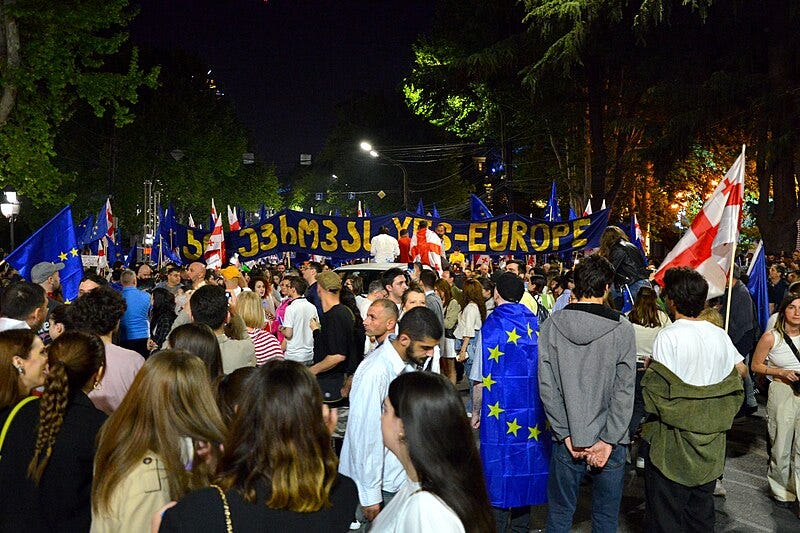Ahead of U.S. Elections, Putin and Orban Score a Win in Georgia
The U.S. and EU struggle to respond as a right-wing populist party engages in sophisticated election manipulation en route to a victory.

It was fitting that Hungarian Prime Minister Viktor Orban congratulated the right-wing populist party Georgian Dream (GD) on its victory before official election results were even available. Following Georgia's October 26 parliamentary elections, Orban wrote on X, "The people of #Georgia know what is best for their country, and made their voice heard today!" Orban's party, Fidesz, is something of a model for GD: a pro-Russian, authoritarian-minded party that wins elections by any means necessary and carries out a program of targeting civil society, independent media, and LGBTQ people while appealing to a rural, conservative base.
Official election results showed that the Georgian Dream won some 54% of the vote. This is enough to stay in power, but not enough for a constitutional majority that it had hoped for -- and Fidesz has in Hungary -- to enact its most radical plans, such as banning opposition parties.
The U.S. and EU have said the vote was neither free nor fair, and there is significant evidence of fraud and violence on Election Day. Transparency International Georgia, which monitored over 2,000 polling stations, observed people voting multiple times and forgers associated with the ruling party in polling places. Videos posted on social media showed pro-ruling party activists beating up opposition supporters. What happened on Election Day was preceded by a pressure campaign against state workers and people with incarcerated relatives.
The day after the vote, Georgian President Salome Zourabichvili decried the results as a "Russian special operation," and said that accepting the results would be tantamount to Georgia losing its sovereignty to Russia, which occupies some 20 percent of the country in two disputed territories. Zourabichvili's powers are mostly ceremonial as the president in a parliamentary system, but as the symbolic leader of the opposition parties, she said that they would not recognize the results. She called for protests on October 28, where tens of thousands turned out and opposition leaders called for new elections. However, these protests ended without a clear path forward. Even amid fraud and violence, the opposition failed in their campaign to present a serious alternative to GD.
Meanwhile, Orban arrived in the Georgian capital Tbilisi as protesters took to the streets, and crowds booed him as his car left the Marriott hotel. The next morning, he gave a speech saying the election was "fair and democratic." Orban, who dismantled Hungary's independent institutions and stifled its independent media while being an EU member, also told Georgia's government to ignore the bloc's criticisms of the elections. EU ministers from 15 countries signed a statement saying that Orban didn't speak for the bloc.
Yet, Orban remains the loudest international voice on Georgia's elections as it is poised to move further towards Moscow and away from EU accession, which around 80 percent of Georgians want. The EU called for Georgian authorities -- controlled by the ruling party -- to swiftly investigate election irregularities. The U.S. State Department also called for an investigation. Both stopped well short of calling the elections illegitimate. GD is unlikely to do any investigations on its own, and civil society activists I spoke to in Tbilisi earlier this month hoped that GD and its honorary chairman, the reclusive billionaire Bidzina Ivanishvili who made his fortune in 1990s Russia, would face more serious sanctions and visa bans if the party engaged in fraud. Yet, the EU passes sanctions by unanimity -- including Orban's Hungary -- and the U.S. is distracted with the presidential election in one week. Without a clear signal from the West, Georgia on its way to becoming an Orban-style illiberal democracy under the geopolitical control of Moscow.



